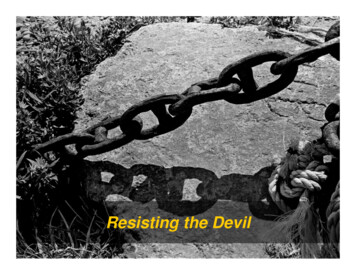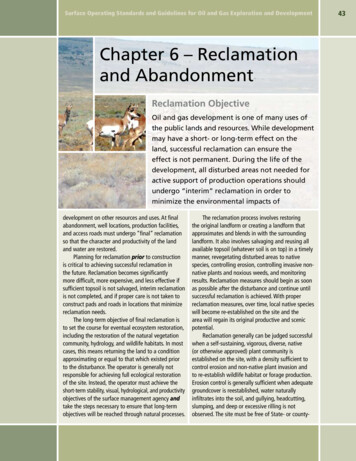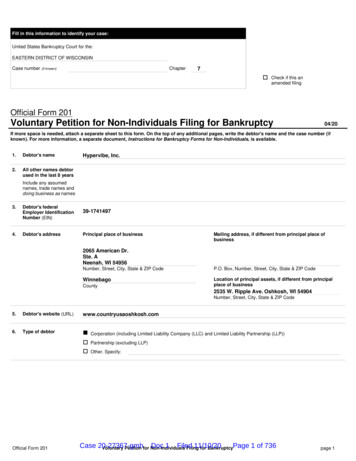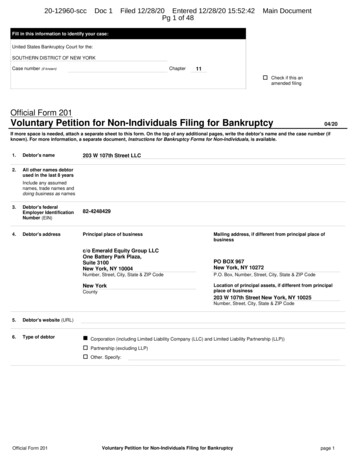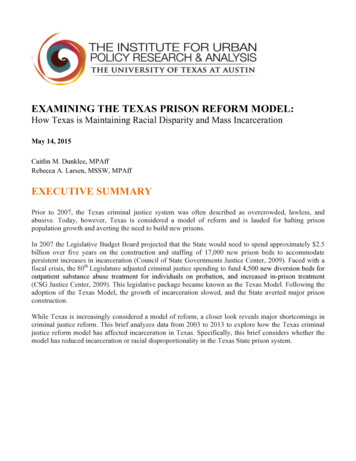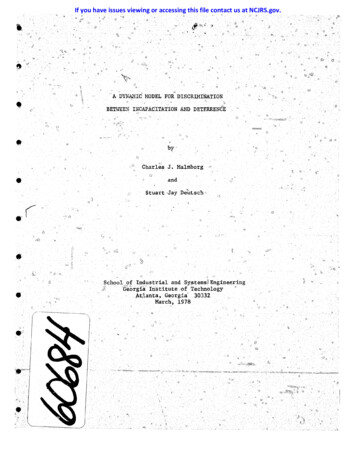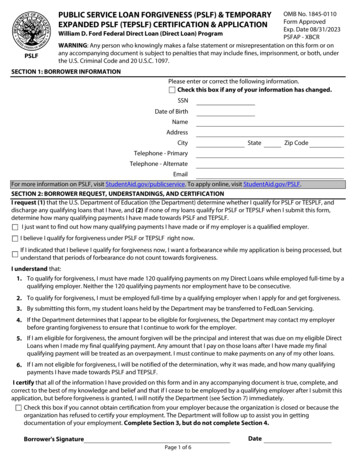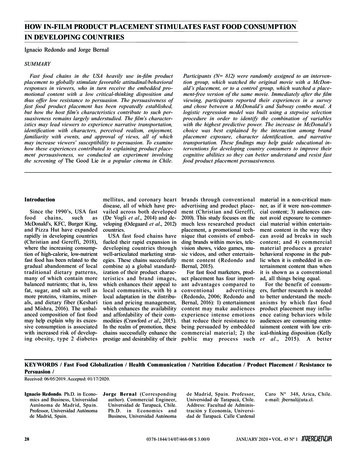
Transcription
The Who, Me? Bible study series for youthgroups explores the lives of people in theBible, highlighting God’s faithfulness and theextraordinary ways God calls and uses ordinaryhumans like us.This CD includes printable leader resourcesand student handouts.JUVENILE NONFICTION / Religion /Biblical StudiesG o d ’ s m e s s y, c o m p l i cat e d, p e r f e c t p l a nteaches at Tri-unity ChristianSchool in Wyoming, Michigan. He and his wifeattend Ridgewood Christian Reformed Church,where they were the directors of youth ministry foreight years before stepping aside to spend moretime with their two daughters.J O s e p hIn this study, Joseph’s journey of betrayal,abandonment, imprisonment, and temptationshows that even when things seem far fromperfect, God is with us.JosephG o d ’ s M e s s y, c o m p l i cat e d,perfect plan13111533790 Who, Me? Joseph cover.indd 17/6/12 10:38 AM
Faith Alive Christian Resources thanks Jeremy Kamper for writing this Bible study.Unless otherwise indicated, Scripture quotations in this publication are from the Holy Bible,New International Version (NIV), 1973, 1978, 1984, 2011 Biblica, Inc. All rights reserved worldwide.Who, Me? Joseph: God’s Messy, Complicated, Perfect Plan by Jeremy Kamper 2012 Faith AliveChristian Resources, Grand Rapids, Michigan. All rights reserved. With the exception of brief excerptsfor review purposes, no part of this book may be reproduced in any manner whatsoever without writtenpermission from the publisher. For information or questions about use of copyrighted material pleasecontact Permissions, Faith Alive Christian Resources, 2850 Kalamazoo Ave SE, Grand Rapids,MI 49560; phone: 1-800-333-8300; fax: 616-726-1164; email: permissions@faithaliveresources.org.Printed in the United States of America.ISBN 978-1-59255-752-3
Who, Me?Each of us has a story to tell, a journey of faith that began at God’s invitation and will continuethroughout eternity. In the Who, Me? series you’ll be drawn into the life of one person in Scripture byhearing their ancient story and exploring it in deeper ways. As you immerse yourselves in Joseph’slife, your group will see how God was at work and is still at work in similar ways in our lives today.You’ll use essential questions to find points of connection between your life and Joseph’s, so thatyou can experience God’s grace more fully and grow as a follower of Christ.Getting startedJoseph: God’s Messy, Complicated, Perfect Plan and all of the Bible studies in the Who, Me? seriesare designed to be easy to use in large or small group settings for Bible study, youth group, churchschool, or parachurch ministry. Aside from a few supplies, you’ll find everything you need on onedisc, including an outline of the essential questions for the study, all of the leader’s materials withBible backgrounds, and printable pages for use within your group. Simply make as many copies ofthe leader and participant materials as you need.StructureEach Bible study in this series follows the same pattern: The Study Outline: This outline offers a quick look at the questions you’ll be exploring in eachsession. Scripture, Materials, and Bible Background: This section helps leaders prepare. We hope leaders will spend time prayerfully reading the Bible passage and Bible background in advance, andgathering or printing the materials listed for the session. Connecting: This section offers ideas for getting started as your group arrives. Rewind: After session 1 the short Rewind section will recap where you’ve been so far in thestudy. It’s also an opportunity for the group to share ways they saw themes from the previoussession emerge in their lives throughout the week. Hearing the Story: In this step a portion of the Bible story or passage is shared by the leader orsomeone in the group, and a short discussion follows. Entering the Story: This step helps you engage the story a second time in creative and imaginative ways that draw out your questions and open you up to the Spirit’s nudging and new insightsabout the story. Living the Story and In My Life: Here the rubber meets the road, usually through a time ofdiscussion and reflection. Each person has the chance to consider how God is speaking to themand seeking to shape them through this story. Closing prayer: Depending on the timeframe you are working with, you may want to use this timefor a brief prayer or expand it to include the requests of the group. Additional Ideas: Each session will include at least two additional ideas for you to use along withor in place of ideas that were offered in the session. You know your group best, so always readthese additional options and build a session that will work best for you.This study is intended to be a tool for you, so feel free to tweak and change any part of it to fit yourunique ministry setting!3
JosephJoseph OutlineSession 1: Rivalry p. 6Essential Questions: What issues, things, or situations tend to make you jealous? Have you everfelt as though God has been absent from part of your own story? Has there ever been a time whenyou didn’t feel loved by someone whom you know does love you? What gives you confidence thatGod loves you?Session 2: Temptation p. 15Essential Questions: What are some kinds of temptations you find really hard to resist? What rolehave you allowed God to play in how you handle temptation? Have you ever done what you thoughtwas the “right thing” in a situation, only to end up in trouble or a victim of someone else’s sin? Howdoes that make you feel about “fairness” and “justice”?Session 3: Abandonment p. 22Essential Questions: Which is easier for you to believe: when a close friend says he or she willalways be there for you, or when God says it? Have you ever been in a situation in which youweren’t patient enough to let things play out and be handled the “right way”? Do you think it’sokay to complain to God when things aren’t going well?Session 4: Opportunity p. 29Essential Questions: When have you experienced a situation that seemed bad at the time butturned out be a blessing in disguise? Is it easy or difficult for you to see God at work in your everyday life? Do you tend to notice God more when life is good or when life is bad? Why do you thinkGod chooses to work through people instead of just making things happen?4
Session 5: Revenge? p. 39Essential Questions: When have you had the opportunity to show forgiveness to someone whohas wronged you? Have you ever been in a situation in which you were troubled by guilt? Name oneperson for whom you would be willing to give up something significant, like your freedom or evenyour life. What makes that person so special to you?Session 6: Reunion p. 51Essential Questions: Consider a time when you questioned why God allowed something to happento you, only to see later on, at least in part, that God was using that seemingly negative circumstancefor good. How did that make you feel about God and his plan for your life? What are some troublingthings going on in your life right now that you hope God will eventually use for good and one day allowyou to understand? Do you find it difficult to trust God to guide the decisions you make in life?5
JosephS e ss i o n 1ScriptureGenesis 37Materials Bibles or printouts of Genesis 37 (pp. 12-13),one per person Writing utensil for each person Printouts of the “In My Life” page (p.14),one per participant, optionalBible BackgroundWhile we tend to think of Joseph as a heroic figure in the Bible, the story doesn’t start out that way.As a teenager, Joseph comes across as something of a show-off and a tattletale. Jacob loved Joseph—the first son of his old age by his favorite wife—more than any of his other sons. That happens toparents, but to his discredit he may have showed it a little too much. Jacob gave Joseph an expensive and exclusive gift in the multicolor coat, and his older brothers were understandably jealous.Joseph also had dreams, each one featuring him at the center, shining with importance. Having adream is one thing; telling your brothers about it is another, especially when you know it’s going tomake them even more disgruntled. Joseph was either terribly naïve or somewhat mean-spirited, forhe evidently shared these dreams with his brothers with great gusto. Joseph even succeeded ingetting his greatest advocate, his father, angry at him over the self-centered dreams: “Will yourmother and I and your brothers actually come and bow down to the ground before you?” (37:10).Well, the brothers get their chance for revenge when Jacob sends Joseph to check on them as theyare away with their flocks. Earlier it was reported that Joseph had “brought their father a bad report”about one of the siblings, and now here comes the tattletale again. They spot him from a long wayoff (probably the multicolor coat), and someone says, “Here comes that dreamer!” Soon they areplotting to murder him. Based on the quick acceleration of their rage, we can sense how deep theirresentment had become.6
The plan was to kill their younger brother and make it look like the work of a wild animal. Interestingly, the oldest, Reuben, wanted not only to spare Joseph but to bring him back home. In the end, theboys took Joseph, stripped him of his “richly ornamented” robe, and threw him into a deep cistern.Reuben was gone while the other brothers sat down to eat; noticing a trading caravan passing by,one of them injected another motive into the plot—greed. “What good will it do just to kill him? Wecan get rid of him and make some money on the side if we sell him to the Ishmaelites.” And that’swhat they did.By the time Reuben had returned, the transaction was done, and the caravan had taken off. He torehis clothes, but, interestingly, it doesn’t say that the brothers told him what they had actually done.Perhaps they didn’t tell him and Reuben assumed that somehow Joseph was kidnapped. We don’tknow. At any rate, the brothers hatched a plan to soak the infamous robe in blood and bring it toJacob. They didn’t even have to lie to the old man—just show him that all too recognizable robe andlet Jacob jump to his own logical conclusion.There was mourning and wailing in the tents of Jacob, who didn’t see his son again until years later.The chapter ends with an ominous note: “the Midianites sold Joseph in Egypt to Potiphar, one ofPharaoh’s officials.”This isn’t a nice story. It’s all about human pride, jealousy, greed, and violence. And there isn’t aword about God in it, until we get to 39:2: “The Lord was with Joseph.” With this we are remindedthat God is always present and God’s purposes will come to fruition, even in the mess of this dysfunctional family.Connecting( va r i e d )As members of your group begin to arrive, provide an opportunity for them to talk about their week,sharing anything they think the rest of the group might find interesting. Consider providing snacksor even having the members take turns supplying snacks each week. Try to keep the conversationlight, but if it seems fitting you could ask your group members to talk about when and where theyhave experienced God’s presence throughout the week. When you’re ready to begin the lesson,lead the group in an opening prayer.Rewind(5 minutes)In subsequent sessions you will take this opportunity to review with your group what you havealready discussed about Joseph’s story. For this first session, however, you’ll want to introduce thisseries about Joseph by briefly explaining why you have selected this study. Then share the formatof the session with your group: each week you’ll begin by giving the group members an opportunity to talk about what is happening in their lives. Then you will review previous group discussionsabout Joseph before moving on to the next part of the story. Each session will involve activities anddiscussion to help your group understand the significance of each aspect of the story. Encourageyour group members to look for similarities between the life of Joseph and their own lives in order torecognize how God was working in Joseph’s life and is still working today.7
Hearing the Story(15 minutes)Read Genesis 37Because it’s important to keep the group’s interest while reading the story, it’s a good idea topractice reading through the passage a few times before you make this presentation. By practicingahead of time, you’ll be able to look up on occasion to make eye contact with your members; thiswill also keep you from being tripped up by unfamiliar terms or unusual phrases. It’s also a goodidea, when reading to your group, to pause occasionally or repeat a word or phrase to provideemphasis. After you have finished presenting the story, ask everyone to open their Bibles toGenesis 37, or hand out the Genesis 37 printout.For future lessons, rather than telling the story yourself, consider assigning various students to presentit to the group.Lead a short discussion, using all or some of the following questions: This chapter mentions more than once that Joseph’s brothers hated him. What had happened tomake Joseph’s brothers dislike him so much? Describe Joseph’s two dreams. How are they similar? How are they different? What did the brothers originally plan to do with Joseph when he came to find them? Why did theynot follow through with this plan? How was Joseph’s disappearance explained to Jacob? Why did Jacob believe the brothers’story, and how did he react? What happens in the story to give us the idea that this is not the end of Joseph?(The last verse mentions Joseph being sold in Egypt, implying that there will be more aboutJoseph in later chapters.)Entering the Story(15 minutes)ActivityHave the group look at the handout of Genesis 37 as you point out that this story is told from aneutral point of view. Then tell them that they are going to retell the story from one of the character’sperspectives. Divide everyone into three small groups and assign each the role of either Joseph,Jacob, or the brothers.Depending on the size of your group, you may wish to form six groups, with every twofollowing the same character(s). Another idea is to separate Reuben from the otherbrothers. This would result in four different perspectives.Before you give the groups time to plan their retelling, advise them that it often helps to have somebackground information to better understand a story. Mention the following: Jacob had two wives: Rachel, whom he loved more, and Leah.8
josephS e ss i o n 1How do you feel when a family member or friend gets something you want or feel you deserve?How does God want us to respond when someone else gets something we want?What issues, things, or situations tend to make you jealous? What would happen if you consideredthe situation from the perspective of those you were envious of?God isn’t mentioned in this part of the story. Have you ever felt as though God has been absentfrom part of your own story? How did that make you feel?Has there ever been a time when you didn’t feel loved by someone who you know does love you?What gives you confidence that God loves you?14
God loves you? session 2: temptation p. 15 Essential Questions: What are some kinds of temptations you find really hard to resist? What role have you allowed God to play in how you handle temptation? Have you ever done what you thought . day life? Do you tend to notice God more when life is good or when
